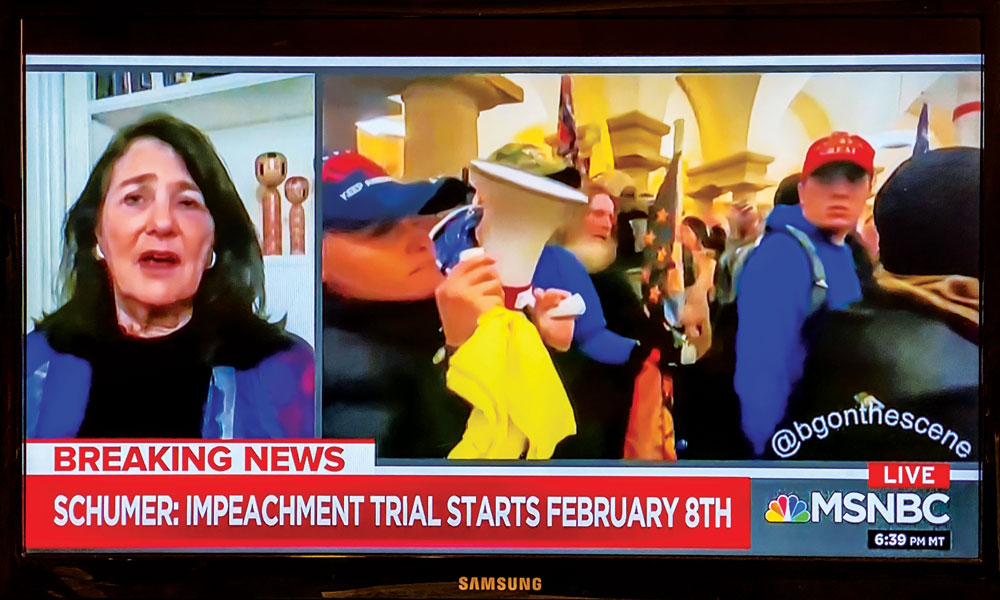
NE Denver’s U.S. Representative Diana DeGette was interviewed after being selected as an impeachment manager in the upcoming Senate trial.
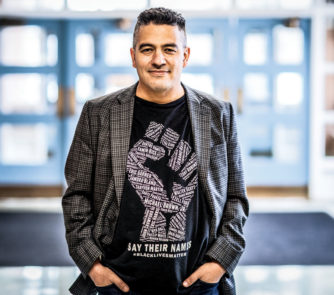
Gerardo Muñoz, named Colorado’s 2021 Teacher of the Year, teaches social studies at Denver International School at Baker. Photo by 211 Photography
Social studies teacher Gerardo Muñoz says he first heard about the attack on the U.S. Capitol when one of his students texted “what’s happening?” After first mistaking that for a casual greeting, he quickly pulled up CNN on his computer and, when his next class began, shared the screen with his students so they could watch the events unfold together and then write down their thoughts and feelings. “I emphasized the importance of bearing witness,” says Muñoz, a Central Park resident who teaches at Denver Center for International Studies at Baker. “I’ve been insisting that students write about their experiences over the past 10 months with the pandemic and the Black Lives Matter uprisings. I actually had one student who said half-jokingly to me: ‘I’m tired of living in history.’”
The Capitol siege, followed by impeachment, and inauguration of a new president have provided social studies teachers and their students with plenty of history-in-the-making moments to observe, question, and assess. East High School’s Matthew Fulford says it can be tricky—especially when some students may feel that the rhetoric they hear is an attack on their identity. But Fulford, who teaches history and constitutional law, says it’s critical to have those discussions. “Every social studies teacher has the responsibility—especially right now—to teach civic engagement and help students process what’s going on around them. People think of civics as a list of things you need to memorize, but for me ‘civics’ is a verb. It’s about getting engaged with your community.”
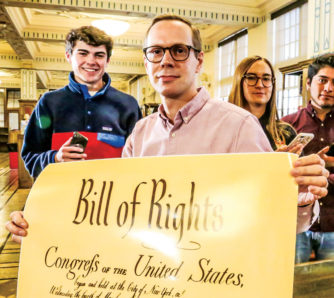
Matthew Fulford teaches history and constitutional law at East High School. He coaches East’s constitutional law team that competes and has won state and national competitions. Photo from a 2018 Front Porch story
Fulford and Muñoz believe that the deep partisan divide, the violence, and the distrust in government is partly due to a lack of education about how government works. “What we’re seeing in our country right now is the result of a deficit of prioritizing history and social studies in general. Our inability to place things in context, to understand different points of view,” says Muñoz.
“Studying history makes you a better citizen,” says Fulford. “It helps you filter information and make decisions about sources. It makes you a better thinker and that helps with citizenship.”
Muñoz directly blames the policy of “No Child Left Behind” that placed a greater emphasis on standardized testing for math and reading. “If it’s not tested, if it’s not a hard skill, then it’s not a priority, it’s not funded and it’s not supported. If the last four years haven’t taught us how badly we need to teach history and civics, I don’t know what will,” says Muñoz.
Both teachers also agree about the importance of helping students get outside their own bubble so they can encounter other points of view. Fulford pointed to a program started by an East High School sociology teacher where students do an exchange with Columbine High School. Students spend a day at each other’s schools and then spend time reflecting on it. “They examine their biases about each other: the inner-city school and the suburban school,” says Fulford. “It’s a powerful experience. The schools are just 10 miles apart but it’s very much a cultural exchange.”
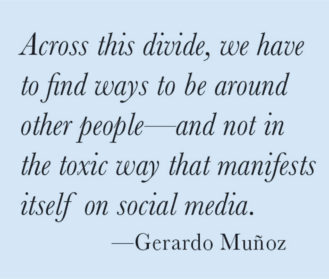 “Across this divide, we have to find ways to be around other people—and not in the toxic way that manifests itself on social media,” says Muñoz. He adds that students—and frankly all Americans—need to have authentic conversations and interactions with people who have different beliefs, experiences, and backgrounds. “We need to ask ‘what has been your lived experience?’”
“Across this divide, we have to find ways to be around other people—and not in the toxic way that manifests itself on social media,” says Muñoz. He adds that students—and frankly all Americans—need to have authentic conversations and interactions with people who have different beliefs, experiences, and backgrounds. “We need to ask ‘what has been your lived experience?’”
Fulford says he has shown his classes a documentary about a program in Israel that brings Jews and Arabs together to try to bridge the divide between the two groups. “You stop making grand generalizations about other people when there’s a real person in front of you. I don’t think we’re as fractured as Jews and Arabs in Israel. But we’re pretty fractured.”
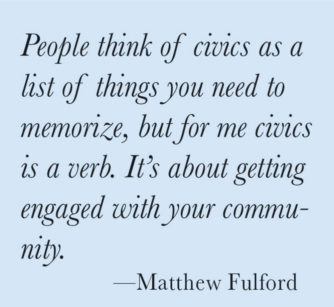 Both Fulford and Muñoz took sharp issue with the 1776 Project report that was issued by the Trump administration in January. The report rejected the idea that slavery was central to America’s founding and attacked “identity politics” as an attack on America.
Both Fulford and Muñoz took sharp issue with the 1776 Project report that was issued by the Trump administration in January. The report rejected the idea that slavery was central to America’s founding and attacked “identity politics” as an attack on America.
“Not one of the members on that commission was a historian, yet they claim we’re sowing disunity by not teaching ‘true history.’ Or they call us revisionist historians. Those are terms you only use if you don’t understand the exceptional complexity of history,” says Fulford. “The job of a historian is not about telling comfortable myths. It’s about coming to terms with who you are and the history of now.”
“The U.S. Constitution is an optimistic document—despite who wrote it,” says Muñoz. “I’ve always framed democracy not as a structure you employ but as an aspiration. There have been patently undemocratic moments in history, but they don’t cancel the idea of democracy. They show that it’s something we’re working toward and aspiring to.”




0 Comments